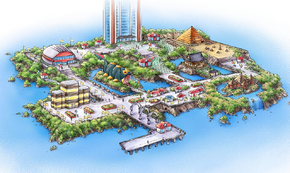| Battle Frontier
|
|
バトルフロンティア
Battle Frontier
|
| "The front lines of Pokémon battling!"
|
|
|
|
| Map description:
|
{{{mapdesc}}}
|
| Location:
|
South of Route 130
|
| Region:
|
Hoenn
|
| Generations:
|
IIIE
|
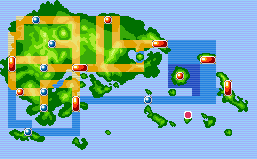
Location of Battle Frontier in Hoenn.
|
| Pokémon world locations
|

The logo of Generation III's Battle Frontier
The Battle Frontier (Japanese: バトルフロンティア Battle Frontier) is a special post-Pokémon League area in Pokémon Emerald that features several arenas where powerful Trainers can battle each other.
The Battle Frontier replaces the Battle Tower in its location south of Route 130, and likewise is only accessible by taking the S.S. Tidal from Lilycove City or Slateport City. Unlike the plain Battle Tower in Pokémon Ruby and Sapphire, as well, each of the facilities in the Battle Frontier has a leader, the Frontier Brain, who may be challenged after certain winning streaks have been made through their respective facilities.
In the anime, this Battle Frontier, rather than being on one of Hoenn's many small islands, is spread across the Kanto region, presumably so as to reflect on the then-recent releases of Pokémon FireRed and LeafGreen as well as Emerald. Much like the Gyms do not have a requirement that Ash beats anyone besides the Gym Leader, Ash is not required to compete in any matches besides those against the Frontier Brain.
In either canon, the Battle Frontier is owned and operated by Scott, who meets up with the player throughout the game in Emerald, and met up with Ash in The Scheme Team.
Pokémon
| Pokémon
|
Games
|
Location
|
Levels
|
Rate
|
| Special Pokémon
|
|
|
R
|
S
|
E
|
|
The same as the Traded Pokémon
|
One
|
|
|
R
|
S
|
E
|

|
Only one
|
|
40
|
One
|
| A colored background means that the Pokémon can be found in this location in the specified game. A white background with a colored letter means that the Pokémon cannot be found here.
|
Items
Overview

In-game view of the Battle Frontier
Upon the player's first entry into Hoenn's Battle Frontier, their Trainer Card will be upgraded into a Frontier Pass by a woman at the entrance. This pass holds the Trainer Card, as well as a small map of the Battle Frontier and the player's records with the Frontier. Saved-up Battle Points, or BP, are listed, as are any of the seven Frontier Symbols the player has won. One battle from within one of the facilities may be recorded and stored on the Frontier Pass, which may be watched or overwritten with another at any time.
On winning through a set amount of battles in any given facility, Battle Points will be awarded, usually in small amounts, but gradually growing through each consecutive streak. Defeating the Frontier Brain of a given facility for the first time awards the silver Symbol of that facility, as well as 10BP, while the second defeat of the same Brain gives the Symbol a golden color and the player another 10BP. The Frontier Brain will only appear in 3-vs-3 single battle mode.
No two Pokémon entered can hold the same item, though all items are allowed to be held (even if they would have no particular reason for being held). Items cannot be used from the Bag during battle. Battles conducted here do not award experience or money. Any Pokémon can be entered for battle, except for the following Pokémon:
Facilities
Battle Tower
Battle Tower
バトルタワー Battle Tower
|
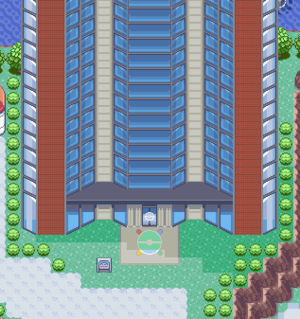
|
| "There is no slogan!"
|
| Participating Pokémon
|
Single
3
|
Double
4
|
|
|
| Wins to obtain the Ability Symbol
|
Silver
35
|
Gold
70
|
|
|
|
Returning from Pokémon Ruby and Sapphire, the Battle Tower (Japanese: バトルタワー Battle Tower) is the most standard of the facilities. Like before, it features a standard 3-vs-3 single or 4-vs-4 Double Battle format, with straight runs of 7 Trainers that get progressively more powerful as the player goes on.
At the 35th and 70th battle, five and ten runs through, respectively, Salon Maiden Anabel, the Frontier Brain, appears. If she is defeated, she awards the Ability Symbol.
All multiplayer functions found in Ruby and Sapphire are retained, as well. For a detailed description of these, see Battle Tower (Generation III). Through a glitch, players may exploit the Battle Tower in Emerald to clone their Pokémon.
In the anime
In the anime, the Battle Tower was the sixth of the facilities Ash challenged, in the episodes Talking a Good Game! and Second Time's the Charm!. After losing the first match, Ash redoubled his efforts and rechallenged Anabel, resulting in a win. This version of the Battle Tower is near Tohjo Falls.
For the Battle Tower in LaRousse City, see here.
Gallery

|

|
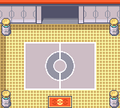
|
| Inside the Battle Tower
|
Hallway after exiting the elevator
|
Before battle in the Battle Tower
|
Battle Palace
Battle Palace
バトルパレス Battle Palace
|
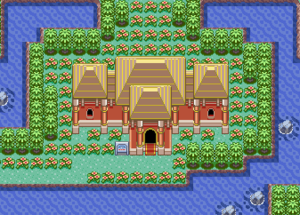
|
| "There is no slogan!"
|
| Participating Pokémon
|
Single
3
|
Double
4
|
|
|
| Wins to obtain the Spirits Symbol
|
Silver
21
|
Gold
42
|
|
|
|
In the Battle Palace (Japanese: バトルパレス Battle Palace), Pokémon battle on their own, without any commands from their Trainers. This is very similar to the rules at the Verdanturf Battle Tent. The style of the Pokémon's battle depends on its Nature, and this style may change when the Pokémon's HP falls low.
At a streak of 21 (three trips through) or 42 (six trips through), Palace Maven Spenser challenges the player. If defeated, he awards the Spirits Symbol.
Battle style
Depending on its Nature, a Pokémon may use different moves in the Battle Palace. All moves belong to one of three categories: Attack, Defense, or Support. The following is the list of attacks in each category:
- Attack: Any move not listed under Defense or Support.
- Defense: All moves that target the user. These moves include Acid Armor, Agility, Amnesia, Aromatherapy, Barrier, Baton Pass, Belly Drum, Bide, Bulk Up, Calm Mind, Camouflage, Charge, Conversion 2, Conversion, Cosmic Power, Defense Curl, Destiny Bond, Detect, Double Team, Dragon Dance, Endure, Focus Energy, Follow Me, Growth, Grudge, Hail, Harden, Haze, Heal Bell, Helping Hand, Howl, Imprison, Ingrain, Iron Defense, Light Screen, Meditate, Milk Drink, Minimize, Mist, Moonlight, Morning Sun, Mud Sport, Perish Song, Protect, Rain Dance, Recover, Recycle, Reflect, Refresh, Rest, Safeguard, Sandstorm, Sharpen, Slack Off, Softboiled, Splash, Stockpile, Substitute, Sunny Day, Swallow, Swords Dance, Synthesis, Tail Glow, Teleport, Water Sport, Wish, and Withdraw.
- Support: All moves that do not deal damage and are not categorized under Defense, as well as Counter and Mirror Coat. These include Assist, Attract, Block, Charm, Confuse Ray, Cotton Spore, Counter, Curse, Disable, Encore, Fake Tears, FeatherDance, Flash, Flatter, Foresight, Glare, GrassWhistle, Growl, Hypnosis, Kinesis, Leech Seed, Leer, Lock-On, Lovely Kiss, Magic Coat, Mean Look, Memento, Metal Sound, Metronome, Mimic, Mind Reader, Mirror Coat, Mirror Move, Nature Power, Nightmare, Odor Sleuth, Pain Split, Poison Gas, PoisonPowder, Psych Up, Roar, Role Play, Sand-Attack, Scary Face, Screech, Sing, Sketch, Skill Swap, Sleep Powder, Sleep Talk, SmokeScreen, Snatch, Spider Web, Spikes, Spite, Spore, String Shot, Stun Spore, Supersonic, Swagger, Sweet Kiss, Sweet Scent, Tail Whip, Taunt, Teeter Dance, Thunder Wave, Tickle, Torment, Toxic, Transform, Trick, Whirlwind, Will-O-Wisp, and Yawn.
Each Nature has a set of ratios that determines how often a Pokémon with that Nature is likely to use Attack, Defense, or Support moves. These ratios change when the Pokémon's HP falls below 50%. During battle, a category is selected for a given turn, and a random attack in that category is chosen from the Pokémon's moveset; if no such attack exists, the Pokémon will "appear incapable of using its power" and skip its turn.
The following table lists each Nature and its move type preferences; it may be rearranged by clicking the boxes next to each column's heading.
| Nature
|
Attack
|
Defense
|
Support
|
Attack (<50%)
|
Defense (<50%)
|
Support (<50%)
|
| Hardy
|
61% |
7% |
32%
|
61% |
7% |
32%
|
| Lonely
|
20% |
25% |
55%
|
84% |
8% |
8%
|
| Brave
|
70% |
15% |
15%
|
32% |
60% |
8%
|
| Adamant
|
38% |
31% |
31%
|
70% |
15% |
15%
|
| Naughty
|
20% |
70% |
10%
|
70% |
22% |
8%
|
| Bold
|
30% |
20% |
50%
|
32% |
58% |
10%
|
| Docile
|
56% |
22% |
22%
|
56% |
22% |
22%
|
| Relaxed
|
25% |
15% |
60%
|
75% |
15% |
10%
|
| Impish
|
69% |
6% |
25%
|
28% |
55% |
17%
|
| Lax
|
35% |
10% |
55%
|
29% |
6% |
65%
|
| Timid
|
62% |
10% |
28%
|
30% |
20% |
50%
|
| Hasty
|
58% |
37% |
5%
|
88% |
6% |
6%
|
| Serious
|
34% |
11% |
55%
|
29% |
11% |
60%
|
| Jolly
|
35% |
5% |
60%
|
35% |
60% |
5%
|
| Naive
|
56% |
22% |
22%
|
56% |
22% |
22%
|
| Modest
|
35% |
45% |
20%
|
34% |
60% |
6%
|
| Mild
|
44% |
50% |
6%
|
34% |
6% |
60%
|
| Quiet
|
56% |
22% |
22%
|
56% |
22% |
22%
|
| Bashful
|
30% |
58% |
12%
|
30% |
58% |
12%
|
| Rash
|
30% |
13% |
57%
|
27% |
6% |
67%
|
| Calm
|
40% |
50% |
10%
|
25% |
62% |
13%
|
| Gentle
|
18% |
70% |
12%
|
90% |
5% |
5%
|
| Sassy
|
88% |
6% |
6%
|
22% |
20% |
58%
|
| Careful
|
42% |
50% |
8%
|
42% |
5% |
53%
|
| Quirky
|
56% |
22% |
22%
|
56% |
22% |
22%
|
In the anime
The Battle Palace was the fifth facility to be challenged by Ash in the anime, where it was on Metallica Island, near the Seafoam Islands. It appeared in Cutting the Ties that Bind! and Ka Boom with a View!.
Gallery

|
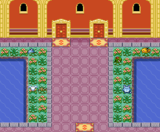
|
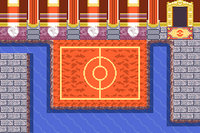
|
| Inside the Battle Palace
|
Hallway
|
Before battle in the Battle Palace
|
Battle Factory
Battle Factory
バトルファクトリー Battle Factory
|
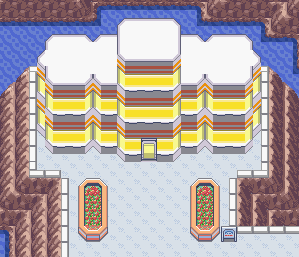
|
| "There is no slogan!"
|
| Participating Pokémon
|
Single
3
|
Double
3
|
|
|
| Wins to obtain the Knowledge Symbol
|
Silver
21
|
Gold
42
|
|
|
|
The Battle Factory (Japanese: バトルファクトリー Battle Factory) is more dedicated to research than the other facilities, and the subject of the scientists' research is the abilities of Trainers when using rental Pokémon in battle. Before the player begins a battle, they will be told some information about the opponent's team, and may switch one of the Pokémon they have with them with one of the Pokémon used by the Trainer they just defeated. This is just like the Battle Tent in Slateport City.
At the 21st and 42nd battle in a streak, three and six times through the Battle Factory, Factory Head Noland will challenge the player to a battle. Like all other Trainers in the facility, including the player, his Pokémon are completely random, and so cannot be known until he is encountered. If he is defeated, he awards the Knowledge Symbol.
Battle style
A Trainer's battle style is based on the moves that his or her Pokémon know. Certain moves fall under one of seven different categories, as shown below:
| Category
|
Moves
|
| 1
|
Acid Armor, Agility, Amnesia, Barrier, Belly Drum, Bulk Up, Calm Mind, Charge, Conversion,
Conversion 2, Cosmic Power, Defense Curl, Double Team, Dragon Dance, Focus Energy, Growth,
Harden, Howl, Iron Defense, Meditate, Minimize, Psych Up, Sharpen, Snatch, Swords Dance,
Tail Glow, Withdraw
|
| 2
|
Attract, Block, Confuse Ray, Disable, Encore, Flatter, Glare, GrassWhistle, Hypnosis, Imprison,
Leech Seed, Lovely Kiss, Mean Look, Poison Gas, PoisonPowder, Sing, Sleep Powder, Snatch,
Spider Web, Spikes, Spore, Stun Spore, Supersonic, Swagger, Sweet Kiss, Taunt, Teeter Dance,
Thunder Wave, Torment, Toxic, Yawn, Will-O-Wisp
|
| 3
|
Aromatherapy, Baton Pass, Detect, Endure, Haze, Heal Bell, Ingrain, Light Screen, Magic Coat,
Milk Drink, Mist, Moonlight, Morning Sun, Mud Sport, Protect, Recover, Reflect, Rest, Safeguard,
Slack Off, Softboiled, Swallow, Synthesis, Recycle, Refresh, Water Sport, Wish
|
| 4
|
Bide, Blast Burn, Counter, Destiny Bond, Double-Edge, Explosion, Facade, Fissure, Flail,
Focus Punch, Frenzy Plant, Grudge, Guillotine, Horn Drill, Hydro Cannon, Hyper Beam, Memento,
Mirror Coat, Overheat, Pain Split, Perish Song, Psycho Boost, Reversal, Selfdestruct, Sky Attack,
Volt Tackle
|
| 5
|
Charm, Cotton Spore, Fake Tears, FeatherDance, Flash, Growl, Kinesis, Knock Off, Leer,
Metal Sound, Sand-Attack, Scary Face, Screech, SmokeScreen, Spite, String Shot, Sweet Scent,
Tail Whip, Tickle
|
| 6
|
Assist, Camouflage, Curse, Follow Me, Metronome, Mimic, Mirror Move, Present, Role Play,
Sketch, Skill Swap, Substitute, Transform, Trick
|
| 7
|
Hail, Rain Dance, Sandstorm, Sunny Day, Weather Ball
|
Depending on how many moves in each category the Trainer's Pokémon know, his or her battle style will be described differently. A move may be counted more than once if more than one Pokémon has it, and any attack not in any of the categories is not considered.
Each category has a threshold number. For the first three categories, this is three, while for the last four categories, it is two. If the Trainer's Pokémon know enough moves to cross the threshold in exactly one or two categories, then their battle style is described by whichever of those categories is farthest down on the table below. If they do not cross the threshold in any category, though, or if they cross it in more than three categories, then the Trainer's battle style is given a special description.
| Category
|
Battle Style
|
| (None)
|
"appears to be free-spirited and unrestrained"
|
| 1
|
"appears to be one based on total preparation"
|
| 2
|
"appears to be slow and steady"
|
| 3
|
"appears to be one of endurance"
|
| 4
|
"appears to be high risk, high return"
|
| 5
|
"appears to be weakening the foe to start"
|
| 6
|
"appears to be impossible to predict"
|
| 7
|
"appears to depend on the battle's flow"
|
(3 or more
categories)
|
"appears to be flexibly adaptable to the situation"
|
In the anime
In the anime, the Battle Factory is located near Cerulean City, and was the first facility challenged by Ash. It appeared in the episodes Numero Uno Articuno and The Symbol Life. The Frontier Brain Noland allows the challenger to choose one of his Pokémon for him to use in a one-on-one battle. According to Scott, he suggested that a sky roof would be added so that Flying-types could use their full potential.
Gallery

|

|

|
| Inside the Battle Factory
|
Room with rental Pokémon
|
Before battle in the Battle Factory
|
Battle Pyramid
Battle Pyramid
バトルピラミッド Battle Pyramid
|
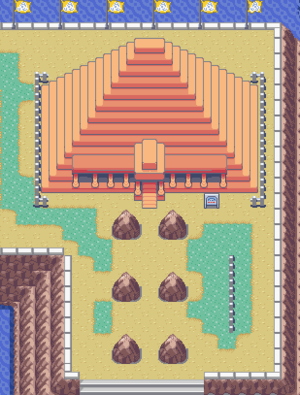
|
| "There is no slogan!"
|
| Wins to obtain the Brave Symbol
|
Silver
3
|
Gold
10
|
|
|
|
The Battle Pyramid (Japanese: バトルピラミッド Battle Pyramid) is a 7-layer pyramid. Each level is shrouded in darkness, and can only be lit up by defeating opponents on the level. Trainers cannot take any items into the pyramid, and items found within can only be used while inside, being stored in a special item bag that is handed out to those who challenge it.
If the player is victorious, the bag stores said items for the next challenge. However, upon defeat the bag's contents return to one Hyper Potion and one Ether.
Wild Pokémon are encountered within the Battle Pyramid, with strategies differing depending on how many floors the player has ventured through. The tactics used by the wild Pokémon will progress as follows:
| Category
|
Tactic
|
Wild Pokémon
|
| 1
|
Pokémon with moves that paralyze
|
Plusle, Minun, Pikachu, Electabuzz, Vileplume,
Manectric, Breloom and Jolteon
|
| 2
|
Pokémon with moves that poison
|
Gulpin, Roselia, Butterfree, Seviper, Skarmory, Ludicolo,
Crobat and Gengar
|
| 3
|
Pokémon with moves that burn
|
Growlithe, Vulpix, Magcargo, Ninetales, Medicham,
Weezing, Dusclops and Houndoom
|
| 4
|
Pokémon with moves that waste PP
|
Dunsparce, Banette, Misdreavus, Ninetales, Absol,
Dusclops, Shedinja and Gengar
|
| 5
|
Pokémon with Levitate
|
Haunter, Chimecho, Solrock, Misdreavus, Claydol,
Weezing, Flygon and Gengar
|
| 6
|
Pokémon with abilities that don't allow escape
|
Diglett, Trapinch, Wynaut, Wobbuffet and Dugtrio
|
| 7
|
Pokémon with moves that freeze
|
Glalie, Sneasel, Dewgong, Piloswine, Jynx, Cloyster,
Walrein and Lapras
|
| 8
|
Pokémon with Selfdestruct and Explosion
|
Weezing, Electrode, Gengar, Golem, Pineco, Solrock,
Forretress and Shiftry
|
| 9
|
Pokémon with Psychic-type moves
|
Wobbuffet, Metang, Exeggutor, Slowking, Xatu,
Alakazam, Starmie and Espeon
|
| 10
|
Pokémon with Rock-type moves
|
Golem, Steelix, Omastar, Lunatone, Shuckle, Armaldo,
Cradily and Aerodactyl
|
| 11
|
Pokémon with Fighting-type moves
|
Poliwrath, Hariyama, Breloom, Medicham, Hitmonchan,
Hitmonlee, Heracross and Machamp
|
| 12
|
Pokémon with moves that alter the weather
|
Quagsire, Tropius, Pupitar, Lapras, Cacturne, Flareon,
Walrein and Gyarados
|
| 13
|
Pokémon with Bug-type moves
|
Pineco, Shuckle, Venomoth, Scizor, Heracross,
Forretress, Armaldo and Shedinja
|
| 14
|
Pokémon with Dark-type moves
|
Sableye, Sneasel, Crawdaunt, Shiftry, Cacturne, Absol,
Houndoom and Umbreon
|
| 15
|
Pokémon with Water-type moves
|
Octillery, Dewgong, Pelipper, Quagsire, Ludicolo,
Slowking, Starmie and Blastoise
|
| 16
|
Pokémon with Ghost-type moves
|
Duskull, Haunter, Banette, Misdreavus, Sableye,
Dusclops, Shedinja and Gengar
|
| 17
|
Pokémon with Steel-type moves
|
Mawile, Magneton, Steelix, Scizor, Forretress,
Skarmory, Aggron and Metagross
|
| 18
|
Pokémon with Dragon-type moves
|
Dragonair, Vibrava, Altaria, Flygon,Aerodactyl,
Gyarados, Kingdra and Charizard
|
| 19
|
Pokémon with Fire-, Water-, Electric-
or Ice-type moves
|
Arcanine, Poliwrath, Raichu, Vaporeon, Jolteon, Flareon,
Ninetales and Starmie
|
| 20
|
Normal-type Pokémon
|
Kangaskhan, Swellow, Ursaring, Porygon2, Tauros,
Fearow, Snorlax and Slaking
|
- See also: List of wild Pokémon in the Battle Pyramid
Item balls on the ground and Pickup share the same pool of items. These items change per 7 floors/1 round.
The items found include HP-restoring and PP-restoring items, Fluffy Tails, status-restoring Berries, Revives, Sacred Ashes, battle items, as well as various held items,
After passing through 21 floors (three passes/rounds through) and 70 floors (ten passes/rounds), Pyramid King Brandon appears at the top to challenge the player. If he is defeated, he awards the Brave Symbol.

The Battle Pyramid flying in the anime
In the anime
In the anime, the Battle Pyramid was located near Pewter City, but has hovercraft-like turbines installed in its underside, thus giving it the ability to move around anywhere. The location of the Battle Pyramid is only revealed to those who have defeated the other six Frontier Brains, and so it was the seventh and final facility challenged by Ash, between Battling the Enemy Within! and Pace - The Final Frontier!.
In A Pyramiding Rage!, the Battle Pyramid traveled to Snowpoint City. Here, Brandon battled and defeated Paul. In the following episodes, the Battle Pyramid was used in defending the Snowpoint Temple.
Gallery

|
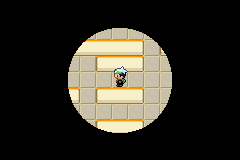
|
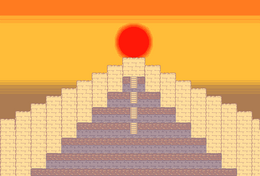
|
| Inside the Battle Pyramid
|
A dark maze
|
Top of the Battle Pyramid
|
Battle Dome
Battle Dome
バトルドーム Battle Dome
|
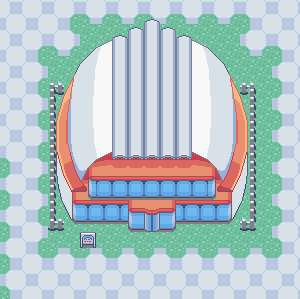
|
| "There is no slogan!"
|
| Participating Pokémon
|
Single
3
|
Double
3
|
|
|
| Wins to obtain the Tactics Symbol
|
Silver
20
|
Gold
40
|
|
|
|
The Battle Dome (Japanese: バトルドーム Battle Dome) is a tournament between 16 Trainers.
Before each battle, the player can find out about their opponent, such as the Pokémon they use, their battle style, and how they train. Competitors can find out who was eliminated in each round by looking at the tournament bracket.
After the player has won five and ten championships, Dome Ace Tucker will challenge him or her. On his defeat, he awards the Tactics Symbol.
Seeding
The tournament bracket is organized as follows:
- Left Bracket: 1 vs 9, 13 vs 5, 8 vs 16, 12 vs 4
- Right Bracket: 3 vs 11, 15 vs 7, 6 vs 14, 10 vs 2
Seedings are determined by their ranking: the sum of the combined base stat totals of all Pokémon, plus 1/20 of the product of the number of different types represented by the Pokémon and the highest level among the Pokémon. If two Trainers tie in ranking, the higher internal Trainer number will win the tiebreaker; the player will always win the tiebreaker against any CPU Trainer, while Dome Ace Tucker will win any tiebreaker against other CPU Trainers. In the event of a tie battle, the higher seed advances and the lower seed is eliminated.
Battle Style
The battle style of a Trainer is solely determined by the effort values of all of the Trainer's Pokémon. A stat is considered to be emphasized if it makes up at least 30% of the team's EVs (taking Nature into account: for this calculation, EVs on a Pokémon with a beneficial Nature are worth 10% more, while EVs on a hindering Nature are worth 10% less), and neglected if there are no EVs in that stat among the entered Pokémon.
If there are any emphasized stats, they are shown (if there are three emphasized stats, only two are shown). Otherwise, if there are any neglected stats, they are shown (if there are more than two, only two are shown; the ones that are shown are further influenced by the number of entered Pokémon having a hindering Nature in the particular stat). Otherwise, the Trainer is said to "raise Pokémon in a well-balanced way."
CPU Battles
Note that the game does not simulate battles between two CPU Trainers. Instead, the outcome between two CPU Trainers is broken down as follows: each Trainer is scored based upon the sum of the following:
- The type affinity of damaging attacks: each attack dealing damage on the team is compared against each Pokémon on the opposing team. 4 points are awarded if the attack is normally effective, 12 if super-effective, and 20 if 4× super-effective. No points are awarded if the attack is resisted. 8 points are deducted if the attack is 4× resisted, and 16 points are deducted if the attack is ineffective. For the purposes of calculating this, Ground-type attacks are considered to be neutral against Pokémon with Levitate. Against Pokémon with Wonder Guard, type matchups that are not super-effective do not award nor deduct points.
- The sum of the base stats of all Pokémon, divided by 10
- The seeding of the Trainer, minus 1
- A random value from 0 to 31
The Trainer with the higher score advances; if this is a tie, then the higher-seeded Trainer advances. During tournaments in which he may be challenged by the player, Tucker always appears as the #2 seeded contestant, and will always win his battles against CPU opponents.
CPU Pokémon Selection
To determine the Pokémon sent out by a CPU Trainer against the player, each of the CPU Trainer's three Pokémon is given a score. There are two scoring methods, which are chosen at random: the offensive method and defensive method. Both methods compare the type affinity of the Pokémon's damaging attacks against each of the three Pokémon on the player's team. In the offensive method, 2 points are awarded if the attack is normally effective, 4 if super-effective, and 8 if 4× super-effective. In the defensive method, 2 points are awarded if the attack is resisted, 4 if 4× resisted, and 8 if ineffective. 2 points are deducted if super-effective, and 4 are deducted if 4× super-effective. No points are awarded or deducted in any other scenario. For the purposes of this calculation, type matchups that are not super-effective against Pokémon with Wonder Guard are ignored (no points are awarded or deducted), and Ground-type attacks are considered to be neutral against Pokémon with Levitate.
If all three Pokémon tie in one method, the other method is used. If all three Pokémon tie in the second method, then two Pokémon and the order they appear are chosen at random. Otherwise, the two highest-scoring Pokémon is chosen (if there is a tie for the second selection, the second selection of Pokémon is chosen at random). There is a 40% chance that the CPU Trainer will lead off with the higher-scoring Pokémon, and a 60% chance of leading off with the lower-scoring Pokémon.
In the anime
In the anime, Ash challenged the Battle Dome, which is located near Lavender Town, in Tactics Theatrics!!, as his third facility.
Gallery

|
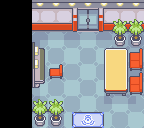
|
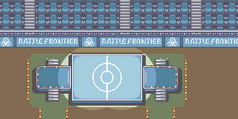
|
| Inside the Battle Dome
|
Trainers can view info on their opponents
|
Before battle in the Battle Dome
|
Battle Arena
Battle Arena
バトルアリーナ Battle Arena
|
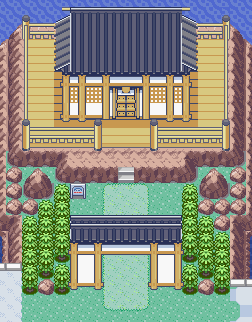
|
| "There is no slogan!"
|
| Wins to obtain the Guts Symbol
|
Silver
28
|
Gold
56
|
|
|
|
The Battle Arena (Japanese: バトルアリーナ Battle Arena) pits two Pokémon against one another for three rounds. If both Pokémon last all three rounds, they are rated on how they battled in three aspects, and the Pokémon with the higher score wins, and the losing Pokémon leaves battle. If they somehow tie, both Pokémon leave battle. A knockout results in an automatic win for the Pokémon that is still standing.
Pokémon are scored on their mind, skill, and body. This is much like the Fallarbor Town Battle Tent rules. The Pokémon with the better rating in each category scores two points, while a tie will award one point to each Pokémon.
- Mind judges Pokémon on their offensive style. One point is awarded if an attack that deals damage is chosen for use (except Counter, Mirror Coat, and Bide, which do not award points, and Fake Out, which deducts one point), and one point is deducted if Protect, Detect, or Endure was chosen. All other moves do not award points. The Pokémon with the higher number of points wins the two points in the overall judgment.
- Skill judges Pokémon on accuracy. One point is awarded if an attack lands successfully, while two points are deducted if it does not, unless it was caused by Protect, Detect, Endure, or Fake Out, in which no points are deducted. The Pokémon with the higher number of points wins the two points in the overall judgment.
- Body judges the amount of HP remaining at the end of the third round compared to their amount at the start of the first. The Pokémon with the better ratio wins the two points in the overall judgment.
The Battle Arena is a series of single challenges, rather than a forced streak of some amount, and so after 28 wins and 56 wins, Arena Tycoon Greta appears to challenge the player. On her defeat, she awards the player with the Guts Symbol.
In the anime
In the anime, Ash challenged the Battle Arena, located near Saffron City, as his second facility, in Wheel of Frontier!. Before the match begins, a special machine is used to determine if the match is 1-vs-1, 2-vs-2, or 3-vs-3.
Gallery

|
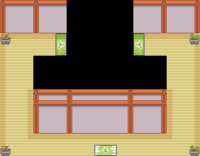
|
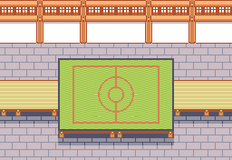
|
| Inside the Battle Arena
|
Hallway
|
Before battle in the Battle Arena
|
Battle Pike
Battle Pike
バトルチューブ Battle Tube
|
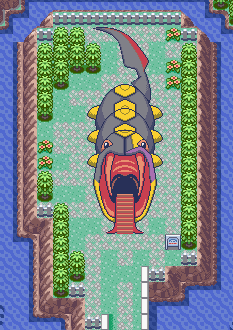
|
| "There is no slogan!"
|
| Wins to obtain the Luck Symbol
|
Silver
2
|
Gold
10
|
|
|
|
The Battle Pike (Japanese: バトルチューブ Battle Tube) is a long pike in the design of a Seviper. Inside of it are 21 rooms, in seven sets of three. The player may choose any of the three in a set to continue through, and in each of the three, any of the following eight events may occur:
- Single battle: The Trainer walks up to the player and battles.
- Double battle: Two Trainers walk up to the player and battle.
- Single battle and healing: 3 Pokémon per side; winner's Pokémon are completely healed.
- Wild Pokémon: wild Dusclops, Seviper, Milotic, Wobbuffet, Breloom, or Electrode appear.
- No event: An NPC stands in the room but does nothing.
- Status effect: A surprise attack will inflict a status on one or more of a player's Pokémon. The status includes Kirlia's burn, paralysis, poison, or sleep and Dusclops's burn or freeze.
- One or two recovery: One or two of the player's Pokémon will be healed.
- Full recovery: All of the player's Pokémon will be healed.
The lady standing outside of the rooms will hint at what is in one of the three rooms. Each quote has two possibilities, but the first is more common than the second.
| Quote
|
Result 1
|
Result 2
|
For some odd reason, I felt a wave
of nostalgia coming from it...
|
Status ailment
|
Heals one or two Pokémon
|
Is it...A Trainer?
I sense the presence of people...
|
Single battle
|
Heals all Pokémon
|
It seems to have the distinct aroma
of Pokémon wafting around it...
|
Wild Pokémon
|
Single battle, then heal party
|
I seem to have heard something...
It may have been whispering...
|
Idle NPC
|
Double battle
|
From every path I sense a dreadful
presence...
|
Battle Pike Queen Lucy
|
The Frontier Brain of the Battle Pike is Pike Queen Lucy. She challenges Trainers who complete 27 rooms (two passes through the pike) and 139 rooms (10 passes). By beating her, one is awarded with the Luck Symbol.
Wild Pokémon
| Pokémon
|
Games
|
Location
|
Levels
|
Rate
|
| Room 0-280
|
|
|
R
|
S
|
E
|

|
Walking
|
|
46, 56-96
|
26%
|
|
|
R
|
S
|
E
|

|
Walking
|
|
46, 56-96
|
26%
|
|
|
R
|
S
|
E
|

|
Walking
|
|
45, 55-95
|
48%
|
| Room 281-560
|
|
|
R
|
S
|
E
|

|
Walking
|
|
46, 56-96
|
26%
|
|
|
R
|
S
|
E
|

|
Walking
|
|
46, 56-96
|
26%
|
|
|
R
|
S
|
E
|

|
Walking
|
|
45, 55-95
|
48%
|
| Room 561-840
|
|
|
R
|
S
|
E
|

|
Walking
|
|
46, 56-96
|
26%
|
|
|
R
|
S
|
E
|

|
Walking
|
|
46, 56-96
|
26%
|
|
|
R
|
S
|
E
|

|
Walking
|
|
45, 55-95
|
48%
|
| Room 840+
|
|
|
R
|
S
|
E
|

|
Walking
|
|
46, 56-96
|
26%
|
|
|
R
|
S
|
E
|

|
Walking
|
|
46, 56-96
|
26%
|
|
|
R
|
S
|
E
|

|
Walking
|
|
45, 55-95
|
48%
|
| A colored background means that the Pokémon can be found in this location in the specified game. A white background with a colored letter means that the Pokémon cannot be found here.
|
Level 50
Open Level
In the anime
In the anime, the Battle Pike is located near Fuchsia City, and Ash challenged it as his fourth facility in Queen of the Serpentine!.
Gallery

|
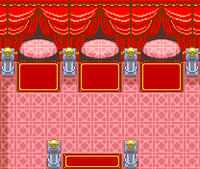
|

|
| Inside the Battle Pike
|
Room with three entrances
|
Before battle in the Battle Pike
|
Other points of interest
Artisan Cave
- Main article: Artisan Cave
The Artisan Cave is a long cave connecting one end of the Battle Frontier to the other. It starts near the Battle Palace and the exit is right next to the Battle Tower. The only wild Pokémon found inside is Smeargle.
House
There is a house next to the Battle Tower. Inside, there is a Trainer who wants to trade a Meowth for a Skitty.
Record Hall
The record hall contains all of the records that the player has set at the Battle Frontier. There are three rooms. The one on the left contains records for the Battle Pike, Dome, and Factory, the one in the center has records for the Battle Tower, and the one on the right contains records for the Battle Palace, Pyramid, and Arena.
If the player mixes records with another Emerald game, Battle Frontier records will be copied over from the other game and compared.
Sudowoodo
A level 40 Sudowoodo is located in the southeast section of the Battle Frontier. Much like in Generation II, NPCs will talk about it as a tree. However, when the player uses the Wailmer Pail on it, it will spring to life. This is the only location of Sudowoodo in the handheld games of Generation III.
Betting man
In the house south of the Battle Pyramid a man can be visited. After receiving at least 3 silver Symbols, he will ask the player to compete in a random facility, which changes daily. The player can give him 5, 10, or 15 Battle Points. If the player wins, the man will give him back twice the amount the player gave him. If the player loses, the Battle Points are lost.
Stats judge
- Main article: Stats judge
In the house above the Pokémon Center is an old man who can judge one of the player's Pokémon's stats. He examines the Pokémon's IVs and gives feedback on how high or low they are. First he describes the Pokémon's "ability", which is based on the sum of all six of its IVs. Then he indicates which stat has the highest IV and what range it falls in. If 2 or more IVs are tied for the highest then he will choose one randomly.
| Pokémon's ability
|
IV total
|
| Average
|
0 to 90
|
| Better-than-average
|
91 to 120
|
| Quite impressive
|
121 to 150
|
| Wonderfully outstanding
|
151 to 186
|
| Highest IV
|
Range
|
| Relatively good
|
0 to 15
|
| Quite impressive
|
16 to 25
|
| Outstanding
|
26 to 30
|
| Flawless
|
31
|
Move Tutors
In a house next to the Battle Dome, there are two Move Tutors. They will teach a Pokémon a selection of attacks for a price in Battle Points.
List of Move Tutor moves
Battle Point Exchange Service Corner

The Battle Point Exchange Service Corner
The Battle Point Exchange Service Corner, or simply the Exchange Service Corner, sells various goods in exchange for Battle Points earned at other parts of the Battle Frontier. Players can purchase goods for their secret base, vitamins, and items that can be held by a Pokémon.

Inside the Exchange Service Corner
| Second Cashier from Right
|
|
|
|
|
|
|
|
|
|
Poké Mart
In the manga
In the Pokémon Adventures manga
In the sixth chapter of the Pokémon Adventures manga, a Trainer named Emerald arrives at the Battle Frontier, where he accidentally interferes in the opening ceremonies and gains the second challenge of clearing the seven Facilities by defeating the Frontier Brains within that time. During this time, Emerald befriends Todd Snap and discovers that the masked Guile Hideout is seeking Jirachi for his own evil purposes after finding out that an overleveled Sceptile, which later became his, was in the Battle Factory. Now learning of this, he also seeks to stop Guile Hideout from achieving his goal, a task easier said than done.
In the Pokémon Battle Frontier manga
The Pokémon Battle Frontier manga features a boy named Enta being invited to the Battle Frontier by Scott. Once there, he is tutored by Rald and begins to challenge the Frontier Brains.
The manga concludes with Enta's battle with Anabel. Despite Enta's challenge of the Frontier Brains being a major focus, Noland, Greta, and Brandon don't appear within the actual series, only appearing on the title page of the fourth chapter.
In the TCG
The EX Emerald expansion for the Pokémon Trading Card Game featured two Battle Frontier-related cards:
Trivia
- A girl inside the Battle Pike says "I've completed the challenge 10 times now, but I've never had to battle a Trainer once." This information would be false, because after two straight wins and again at ten straight wins, she would have to battle Lucy. However, it should be noted that she did not state whether or not she beat the Battle Pike ten times in a row, so this might not necessarily be an error.
- If, by cheating, players enter through the Battle Palace's Single Battle Halls, the game will then randomly choose Lv. 50 or Open Level, and they will be able to battle Trainers with all six Pokémon they have in their party. When they battle the second Trainer, only the first three Pokémon in their party may be used, and their only move will be Sketch.
- All enemy Trainers in the Battle Frontier, except the Frontier Brains, greet the player character before battle with a string of six preset words, phrases, or characters from the easy chat system. After the battle, the enemy gives out another message of the same format which depends on whether they've won or lost. This is also the case for all enemies in the Battle Tents or Trainer Hill.
- However, this is not the case for the greetings of any Apprentices that have been mentored by the player or other individuals. When greeting the player prior to battling in the Battle Tower, the Apprentice will typically state the name of his or her mentor, as well as his or her numerical position in the line of all Apprentices tutored by someone (such as being the 7th apprentice tutored by the player).
- Messages are also altered for enemy Trainers present within the Battle Pyramid. After a battle, they provide the player with contextual hints on certain aspects of the challenge, such as the location of a given floor's exit, the number of remaining Trainers to be fought on a floor, or the number of remaining items on a given floor.
In other languages
Battle Frontier
|
Battle Tower
|
Battle Palace
|
Battle Factory
|
Battle Pyramid
|
Battle Dome
|
Battle Arena
|
Battle Pike
|












































